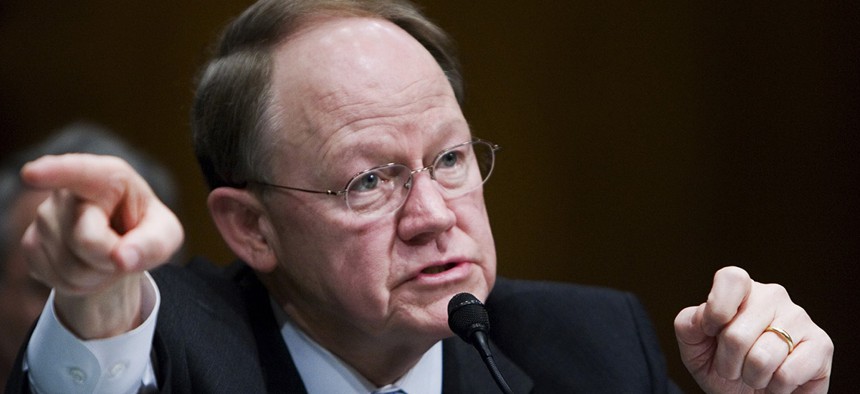Former Intelligence Director: Law Enforcement Must 'Adapt' to Encryption

Former Director of National Intelligence Mike McConnell Manuel Balce Ceneta/AP File Photo
Mike McConnell, who has served as NSA Director and director of national intelligence, continues his new crusade for strong encryption.
In the ongoing duel over encryption between law enforcement and the technology industry, the government has repeatedly goaded developers to “try harder” to come up with a strong encryption standard that still allows authorities access to communications, a balance that most experts maintain is impossible to strike.
But a former top intelligence official wants to flip the script.
Michael McConnell, who served in high-ranking intelligence positions under two Republican presidents, says it’s up to law enforcement to “adapt to ubiquitous encryption.”
“Don’t get in the way of progress,” McConnell said Thursday at a panel during an encryption summit hosted by The Washington Post. “Don’t get in the way of innovation and creativity, because this is going to happen. Somebody’s going to provide this encryption.”
McConnell’s position is a complete departure from the perspective he represented in government, a shift he has publicly acknowledged. When he ran the National Security Agency in the 1990s, McConnell was a vocal supporter of the Clipper Chip, a device developed by the NSA that allowed the government to decrypt electronic communications.
The debate over the Clipper Chip was a precursor to the current discussion about encryption, but McConnell, now a senior executive advisor at Booz Allen Hamilton, finds himself on the other side of the table for this one.
He argued Thursday that the benefits of law enforcement access to communications are far outweighed by the potential economic harm of weak encryption, which could make widespread commercial espionage possible.
“If law enforcement starts to change the way they think about this, I think there are many, many ways to carry out the mission, given that you are faced with a situation where technology is not going to be reversed,” he said. “There is a crying need for this kind of data protection, in motion and at rest, to protect the economic interests of this country.”
While Booz Allen Hamilton does offer technology consulting services, the company does not appear to have publicly come out in favor of strong encryption practices.
McConnell originally made his case for encryption in a Washington Post op-ed published this summer, which he co-wrote with former Homeland Security Secretary Michael Chertoff and former Deputy Defense Secretary William Lynn.
On Thursday, his arguments were countered by Kiran Raj, senior counsel to the deputy attorney general, who has appeared in public repeatedly to speak in support of the Justice Department’s push for a key to locked-away communication.
As FBI Director James Comey has argued, Raj said Thursday that it’s on U.S. businesses to come up with a solution to the encryption question.
“We have the most innovative tech companies in the world. If someone’s going to solve the problem, it’s going to be the folks in the industry.”
McConnell agreed that a secure system that allowed for law enforcement access would be ideal, but questioned its feasibility. Asked to choose between encryption and access, he said: “If I have to trade one for the other I would take ubiquitous encryption of data in motion and at rest. But I would prefer to have both.”



